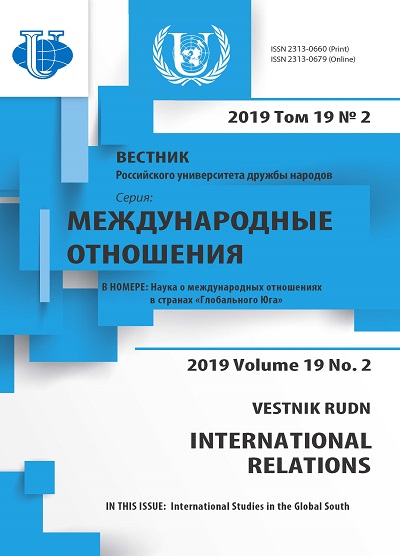The BRICS: Paradigm Shift in Dealing with New Challenges
- Authors: Martynov B.F.1
-
Affiliations:
- MGIMO University
- Issue: Vol 19, No 2 (2019): International Studies in the Global South
- Pages: 201-206
- Section: THEMATIC DOSSIER
- URL: https://journals.rudn.ru/international-relations/article/view/21458
- DOI: https://doi.org/10.22363/2313-0660-2019-19-2-201-206
- ID: 21458
Cite item
Full Text
Abstract
The mankind has been actively using a relatively new geopolitical space: the space of information. Obviously, the economic and scientific progress opens new horizons and possibilities, still not clearly understood by people. This brings about many changes, with either good or bad consequences, depending on who uses the information and what aims are pursued. The present system of international relations is characterized by many new features; it’s becoming more “unpredictable” and “chaotic”. Information wars and “fake” news contribute in its turn to the turbulent character of international relations, pushing forward misconceptions and distorted visions of different situations, and thus provoking conflicts. At the same time, the world is badly short of new ideas, which could more adequately answer the global problems. These new ideas could hardly be produced by the “old”, traditional actors. At the same time, the BRICS countries, representing the new “ascending” civilizations of non-Western nature and not being bound in this sense by the rules of “Euro-Atlantic solidarity”, could collectively propose some new approaches to the global issues. BRICS, as a format of states with accelerated economic indices, should lay a wider conceptual platform for its further dynamics. It should provide a more active information policy and elaborate a “new” conceptual basis, founded on rather traditional and “old” principles - common respect for the international law, derived from political and juridical cultures, historic and social practices.
About the authors
Boris Feodorovich Martynov
MGIMO University
Author for correspondence.
Email: bfmartynoff@gmail.com
PhD, Dr. of Science (Political Sciences), professor, chief of the Department of international relations and foreign policy of Russia
Moscow, Russian FederationReferences
- Diamond, J.M. (2011). Collapse. How Societies Choose to Fail or Succeed. Viking Press.
- Harari, Y.N. (2015). Homo Deus. A Brief History of Tomorrow. London: Penguin Random House.
- Katzenstein, P. (Eds.). (2010-2012). Civilization in World Politics. Books 1-3. Routledge.
- Kissinger, H. (2014). World Order. Penguin Press.
- Kliksberg, B. (2006). Mitos y realidades sobre la criminalidad en America Latina. Buenos Aires.
- Martynov, B.F. & Lavalle, V.-H. (2019). De la Guerra informative hacía una “nueva guerra fria”? Iberoamérica, 1, 26-43.
- Martynov, B.F. (2019). Chaos Synergy, Geopolitics And Culture Explain History Of International Relations. A Critique of William Wohlforth. MGIMO Review of International Relations, 64 (1), 19-28. doi: 10.24833/2071-8160-2019-1-64-19-28.
- Mazover, M. (2017). Governar o Mundo. Lisboa: Edições 70.
- Moloeznik, M.-P. (2011). Apuntes criticos sobre las más recientes iniciativas de reformas legislativas de Presidente Felipe Calderon Hinojosa en material de seguridad y modelo policial. Letras Juridicas. Revista electronica de derecho del Centro Universitario de la Ciénega, 12, 1-31. URL: http://letrasjuridicas.cuci.udg.mx/index.php/letrasjuridicas/ article/view/138/136 (accessed: 03.03.2019).
- Morris, I. (2014). War: What Is It Good for? London: Profile Books.
- O’Neil, J. (2011). The Growth Map: Economic Opportunity in the BRICS and Beyond. London: Portfolio / Penguin.
- Sharma, R. (2010). Paises emergentes. Madrid: Aguilar.
- Toropchin, G.V. (2017). From Goa to Xiamen. On Some Aspects of Political Cooperation within BRICS. International Organizations Research Journal, 12 (1), 174-188. doi: 10.17323/1996-7845-2017-01-174. (In Russian).
- Voronin, E.R. (2013). Transatlantic Links and BRICS: Prospects of Strategic Co-existence. MGIMO Review of International Relations, 2 (29), 33-37. (In Russian).
Supplementary files










